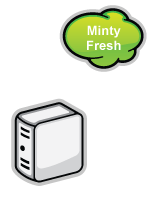

Icinga supports a feature that does "freshness" checking on the results of host and service checks. The purpose of freshness checking is to ensure that host and service checks are being provided passively by external applications on a regular basis.
Freshness checking is useful when you want to ensure that passive checks are being received as frequently as you want. This can be very useful in distributed and failover monitoring environments.

Icinga periodically checks the freshness of the results for all hosts services that have freshness checking enabled.
A freshness threshold is calculated for each host or service.
For each host/service, the age of its last check result is compared with the freshness threshold.
If the age of the last check result is greater than the freshness threshold, the check result is considered "stale".
If the check results is found to be stale, Icinga will force an active check of the host or service by executing the command specified by in the host or service definition.
![[Tip]](../images/tip.png) |
Tip |
|---|---|
|
An active check is executed even if active checks are disabled on a program-wide or host- or service-specific basis. |
For example, if you have a freshness threshold of 60 for one of your services, Icinga will consider that service to be stale if its last check result is older than 60 seconds.
Here's what you need to do to enable freshness checking...
Enable freshness checking on a program-wide basis with the check_service_freshness and check_host_freshness directives.
Use service_freshness_check_interval and host_freshness_check_interval options to tell Icinga how often in should check the freshness of service and host results.
Enable freshness checking on a host- and service-specific basis by setting the check_freshness option in your host and service definitions to a value of 1.
Configure freshness thresholds by setting the freshness_threshold option in your host and service definitions.
Configure the check_command option in your host or service definitions to reflect a valid command that should be used to actively check the host or service when it is detected as stale.
The check_period option in your host and service definitions is used when Icinga determines when a host or service can be checked for freshness, so make sure it is set to a valid timeperiod.
![[Tip]](../images/tip.png) |
Tip |
|---|---|
|
If you do not specify a host- or service-specific freshness_threshold value (or you set it to zero), Icinga will automatically calculate a threshold automatically, based on a how often you monitor that particular host or service. We would recommend that you explicitly specify a freshness threshold, rather than let Icinga pick one for you. |
An example of a service that might require freshness checking might be one that reports the status of your nightly backup jobs. Perhaps you have a external script that submit the results of the backup job to Icinga once the backup is completed. In this case, all of the checks/results for the service are provided by an external application using passive checks. In order to ensure that the status of the backup job gets reported every day, you may want to enable freshness checking for the service. If the external script doesn't submit the results of the backup job, you can have Icinga fake a critical result by doing something like this...
Here's what the definition for the service might look like (some required options are omitted)...
define service{
host_name backup-server
service_description ArcServe Backup Job
active_checks_enabled 0 ; active checks are NOT enabled
passive_checks_enabled 1 ; passive checks are enabled (this is how results are reported)
check_freshness 1
freshness_threshold 93600 ; 26 hour threshold, since backups may not always finish at the same time
check_command no-backup-report ; this command is run only if the service results are "stale"
...other options...
}
Notice that active checks are disabled for the service. This is because the results for the service are only made by an external application using passive checks. Freshness checking is enabled and the freshness threshold has been set to 26 hours. This is a bit longer than 24 hours because backup jobs sometimes run late from day to day (depending on how much data there is to backup, how much network traffic is present, etc.). The no-backup-report command is executed only if the results of the service are determined to be stale. The definition of the no-backup-report command might look like this...
define command{
command_name no-backup-report
command_line /usr/local/icinga/libexec/check_dummy 2 "CRITICAL: Results of backup job were not reported!"
}
If Icinga detects that the service results are stale, it will run the no-backup-report command as an active service check. This causes the check_dummy plugin to be executed, which returns a critical state to Icinga. The service will then go into to a critical state (if it isn't already there) and someone will probably get notified of the problem.
Sometimes you might find messages like the following in icinga.log:
Check results for service x on host y are stale by 0d 0h 0m 10s (threshold=0d 0h 10m 0s). Forcing an immediate check of the service...
This means that the service was checked in the past and the threshold time (e.g. 10m) has passed without any new check results so a check is forced by the core.
The message results from the code fragment in base/checks.c (lines folded for better
readability)
/* the results for the last check of this service are stale */
if (expiration_time < current_time) {
get_time_breakdown((current_time - expiration_time), &days, &hours, &minutes, &seconds);
get_time_breakdown(freshness_threshold, &tdays, &thours, &tminutes, &tseconds);
/* log a warning */
if (log_this == TRUE)
logit(NSLOG_RUNTIME_WARNING, TRUE,
"Warning: The results of service '%s' on host '%s' are stale by %dd %dh %dm %ds (threshold=%dd %dh %dm %ds).
I'm forcing an immediate check of the service.\n",
temp_service->description, temp_service->host_name,
days, hours, minutes, seconds, tdays, thours, tminutes, tseconds
);
log_debug_info(DEBUGL_CHECKS, 1,
"Check results for service '%s' on host '%s' are stale by %dd %dh %dm %ds (threshold=%dd %dh %dm %ds).
Forcing an immediate check of the service...\n",
temp_service->description, temp_service->host_name,
days, hours, minutes, seconds, tdays, thours, tminutes, tseconds
);
return FALSE;
}
By default, the following applies
expiration_time = last_check + freshness threshold (e.g. 10m)
expiration_time is in the past (< current_time) == stale
the difference between now and expiration time is shown in the log (e.g. 10s)
If the service has not been checked now, but in the past (event_start > last_check) and its freshness threshold is 0, max_service_check_spread multiplied by the interval is added as additional offset (happens during startup, in order to detect how fast the initial service check (and state + output) must happen).
© 1999-2009 Ethan Galstad, 2009-2017 Icinga Development Team, https://www.icinga.com